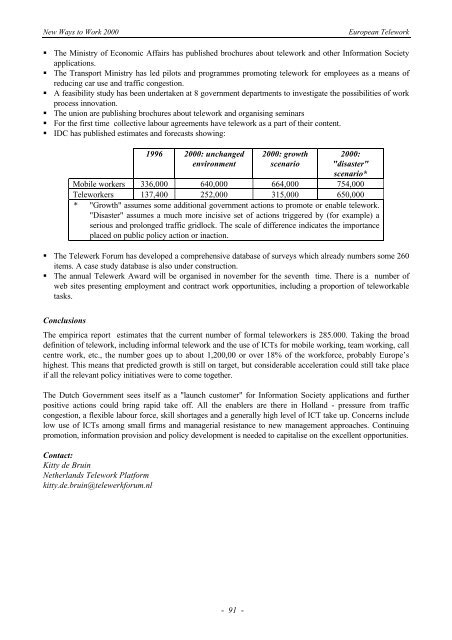eWORK 2000 - European Telework Week
eWORK 2000 - European Telework Week
eWORK 2000 - European Telework Week
- No tags were found...
Create successful ePaper yourself
Turn your PDF publications into a flip-book with our unique Google optimized e-Paper software.
New Ways to Work <strong>2000</strong><strong>European</strong> <strong>Telework</strong>• The Ministry of Economic Affairs has published brochures about telework and other Information Societyapplications.• The Transport Ministry has led pilots and programmes promoting telework for employees as a means ofreducing car use and traffic congestion.• A feasibility study has been undertaken at 8 government departments to investigate the possibilities of workprocess innovation.• The union are publishing brochures about telework and organising seminars• For the first time collective labour agreements have telework as a part of their content.• IDC has published estimates and forecasts showing:1996 <strong>2000</strong>: unchangedenvironment<strong>2000</strong>: growthscenario<strong>2000</strong>:"disaster"scenario*Mobile workers 336,000 640,000 664,000 754,000<strong>Telework</strong>ers 137,400 252,000 315,000 650,000* "Growth" assumes some additional government actions to promote or enable telework."Disaster" assumes a much more incisive set of actions triggered by (for example) aserious and prolonged traffic gridlock. The scale of difference indicates the importanceplaced on public policy action or inaction.• The Telewerk Forum has developed a comprehensive database of surveys which already numbers some 260items. A case study database is also under construction.• The annual Telewerk Award will be organised in november for the seventh time. There is a number ofweb sites presenting employment and contract work opportunities, including a proportion of teleworkabletasks.ConclusionsThe empirica report estimates that the current number of formal teleworkers is 285.000. Taking the broaddefinition of telework, including informal telework and the use of ICTs for mobile working, team working, callcentre work, etc., the number goes up to about 1,200,00 or over 18% of the workforce, probably Europe’shighest. This means that predicted growth is still on target, but considerable acceleration could still take placeif all the relevant policy initiatives were to come together.The Dutch Government sees itself as a "launch customer" for Information Society applications and furtherpositive actions could bring rapid take off. All the enablers are there in Holland - pressure from trafficcongestion, a flexible labour force, skill shortages and a generally high level of ICT take up. Concerns includelow use of ICTs among small firms and managerial resistance to new management approaches. Continuingpromotion, information provision and policy development is needed to capitalise on the excellent opportunities.Contact:Kitty de BruinNetherlands <strong>Telework</strong> Platformkitty.de.bruin@telewerkforum.nl- 91 -








